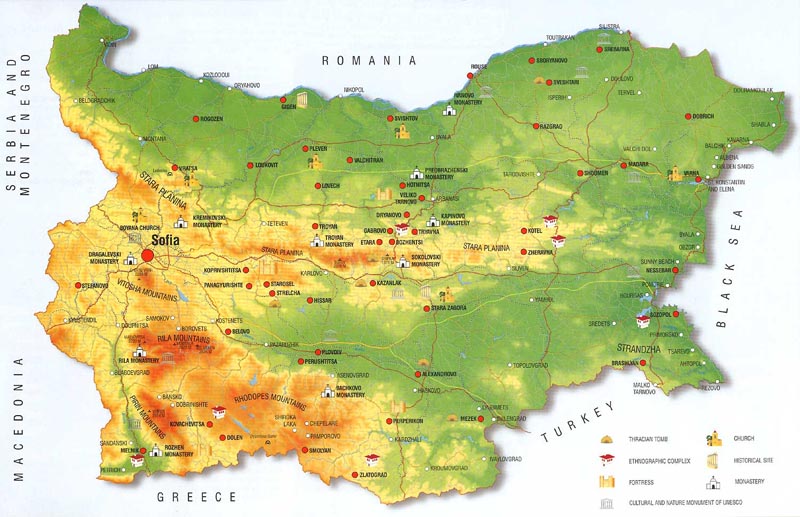
Bulgaria, officially the Republic of Bulgaria (Bulgarian: Република България, is a country located in Southeastern Europe. It is bordered by Romania to the north, Serbia and Macedonia to the west, Greece and Turkey to the south and the Black Sea to the east. With a territory of 110,994 square kilometres (42,855 sq mi), Bulgaria is Europe’s 14th-largest country. Its location has made it a historical crossroad for various civilisations and as such it is the home of some of the earliest metalworking, religious and other cultural artifacts in the world.
Prehistoric cultures began developing on Bulgarian lands during the Neolithic period. Its ancient history saw the presence of the Thracians, and later the Greeks and Romans. The emergence of a unified Bulgarian state dates back to the establishment of the First Bulgarian Empire in 681 AD, which dominated most of the Balkans and functioned as a cultural hub for Slavic peoples during the Middle Ages. With the downfall of the Second Bulgarian Empire in 1396, its territories came under Ottoman rule for nearly five centuries. The Russo-Turkish War of 1877–1878 created the Third Bulgarian State. The following years saw several conflicts with its neighbours, which prompted Bulgaria to align with Germany in both World Wars. In 1946 it became a Socialist state with a single-party system. In 1989 the Communist Party allowed multi-party elections, following which Bulgaria transitioned to democracy and a market-based economy.
The population of 7.36 million people is predominantly urban and mainly concentrated in the administrative centres of its 28 provinces. Most commercial and cultural activities are concentrated in the capital Sofia. The strongest sectors of the economy are heavy industry, power engineering and agriculture, all relying on local natural resources.
The current political structure dates to the adoption of a democratic constitution in 1991. Bulgaria is a unitary parliamentary republic with a high degree of political, administrative and economic centralisation. It is a member of the European Union, NATO and the Council of Europe; a founding state of the Organization for Security and Co-operation in Europe (OSCE); and has taken a seat at the UN Security Council three times. (Source Wikipedia.com)
Area: 111,000 sq km, South Europe
Population: 7,92 mil (2007 est.)
Official language: Bulgarian
Alphabet: Cyrillic
National Day: March 3
Capital City: Sofia (1,2 mil)
Other large cities: Plovdiv; Varna; Burgas; Ruse
EU member, NATO member
Foreign direct investment: 21.1% of GDP (EUR 6,1 billions)
5 year average GDP growth: 6.1%
Corporate income tax: 10%
VAT: 20%
Agriculture: vegetables, fruit, tobacco, wine, wheat, barley, sunflowers, sugar beets
Industries: electricity, gas, water, food, beverages, tobacco, machinery and equipment, base metals, chemical products, refined petroleum, nuclear fuel
Natural resources: bauxite, copper, lead, zinc, coal, timber, arable land
Tourism: Black Sea, spa and mountain resorts; historical places and museums; rural and eco tourism
Monetary unit: Lev (1 Lev~0.77 CAD)
International automobile sign: BG
International phone code: +359

Leave A Comment